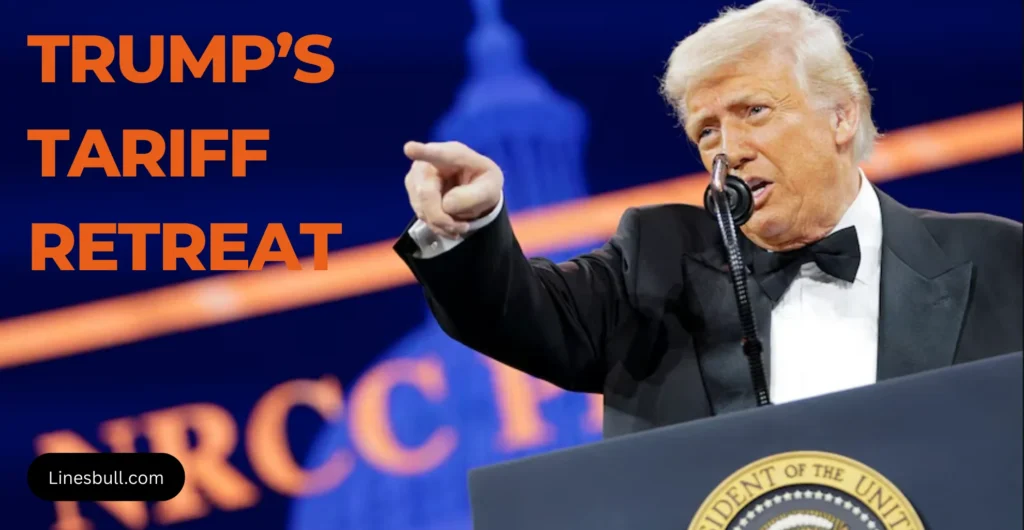Trump Hits Pause on Tariff Plan Amid Market Jitters and Political Backlash
Washington, D.C. – In a sudden about-face, former President Donald Trump announced a three-month pause on his sweeping new tariffs just one week after unveiling them, a move signaling mounting pressure from financial markets, political allies, and the business community.
“They were getting a little yippy,” Trump told reporters, referencing the growing unease among Republican lawmakers and industry leaders over the economic fallout. “A little afraid.”
Trump’s decision, delivered via a social media post, caught even some of his top advisors off guard. It marked a rare retreat for a president known for his hardline trade rhetoric and unwavering public stance. Just days earlier, Trump had declared: “MY POLICIES WILL NEVER CHANGE.”
The pause affects all new tariffs, except those targeting China, and came as Treasury Secretary Scott Bessent and other White House officials raised alarms over a sharp sell-off in the U.S. Treasury market. Senior economic aides had briefed Trump earlier in the day on the mounting risks as bond yields spiked — a sign of investor anxiety.
Market Meltdown Sparks Concern
Trump had not yet finalized his decision to pause the tariffs when he took to social media early Wednesday to tout the stock market. But by the afternoon, market turbulence and warnings from key executives pushed the White House to act.
“The bond market is very tricky,” Trump said. “I saw last night where people were getting a little queasy.”
Inside the Oval Office, Trump crafted the announcement alongside two top advisors — Commerce Secretary Howard Lutnick and Bessent — the latter of whom reportedly helped steer the president toward delaying the tariffs.
“It was written from the heart,” Trump remarked, describing the informal nature of the decision.
Despite calming markets temporarily, Trump added to the uncertainty by hinting he may grant tariff exemptions to certain U.S. firms based on “instinct.”
White House in Whirlwind as Decision Lands
The announcement sparked confusion across the administration. Even U.S. Trade Representative Jamieson Greer, who was testifying on Capitol Hill when the news broke, seemed unaware of the president’s pivot.
“It looks like your boss just pulled the rug out from under you,” Rep. Steven Horsford (D-Nev.) told Greer during the hearing.
Trump’s economic team scrambled to frame the move as part of a broader strategy — not a reversal. Bessent insisted the pause was part of a plan to drive foreign governments to the negotiating table.
“This was his strategy all along,” Bessent said, recounting a lengthy discussion with Trump in Palm Beach over the weekend.

Behind the Scenes: Bond Market Turmoil and Business Pressure
The final tipping point came from alarm bells in the bond market. Historically a safe haven during market volatility, U.S. Treasuries saw aggressive selling this week, pushing yields up and exposing fears that foreign investors were pulling back from U.S. debt. The Treasury Department’s latest bond auction drew weak demand, compounding concerns that the government could face funding challenges if the sell-off continued.
“Uncomfortable, but normal,” Bessent said in a TV interview, downplaying the market reaction while acknowledging internal concerns.
Trump, a close watcher of cable news, had also seen warnings from trusted voices. On Fox Business, JPMorgan Chase CEO Jamie Dimon said a recession was a “likely outcome” of continued trade escalation.
Business Leaders, GOP Push Back
Behind closed doors, White House phone lines lit up. Top CEOs, Republican lawmakers, and key allies made urgent appeals to Chief of Staff Susie Wiles, Vice President JD Vance, and Secretary Bessent, urging the president to reconsider.
Wiles, insiders said, played a crucial role in convincing Trump the tariffs were costing him political goodwill. Lawmakers were reportedly inundated with calls from concerned constituents as markets faltered.
Even so, the president insisted his credibility remained intact. Speaking outside the White House beside a trio of colorful race cars, Trump reflected on the turnaround.
“You have to have flexibility,” he said. “I think in financial markets, because they change — look how much you change today.”
While markets breathed a temporary sigh of relief, the president’s sudden policy shift has left lingering uncertainty about what comes next — and whether the pause will turn into a full reversal or merely a brief detour in an ongoing trade fight.


